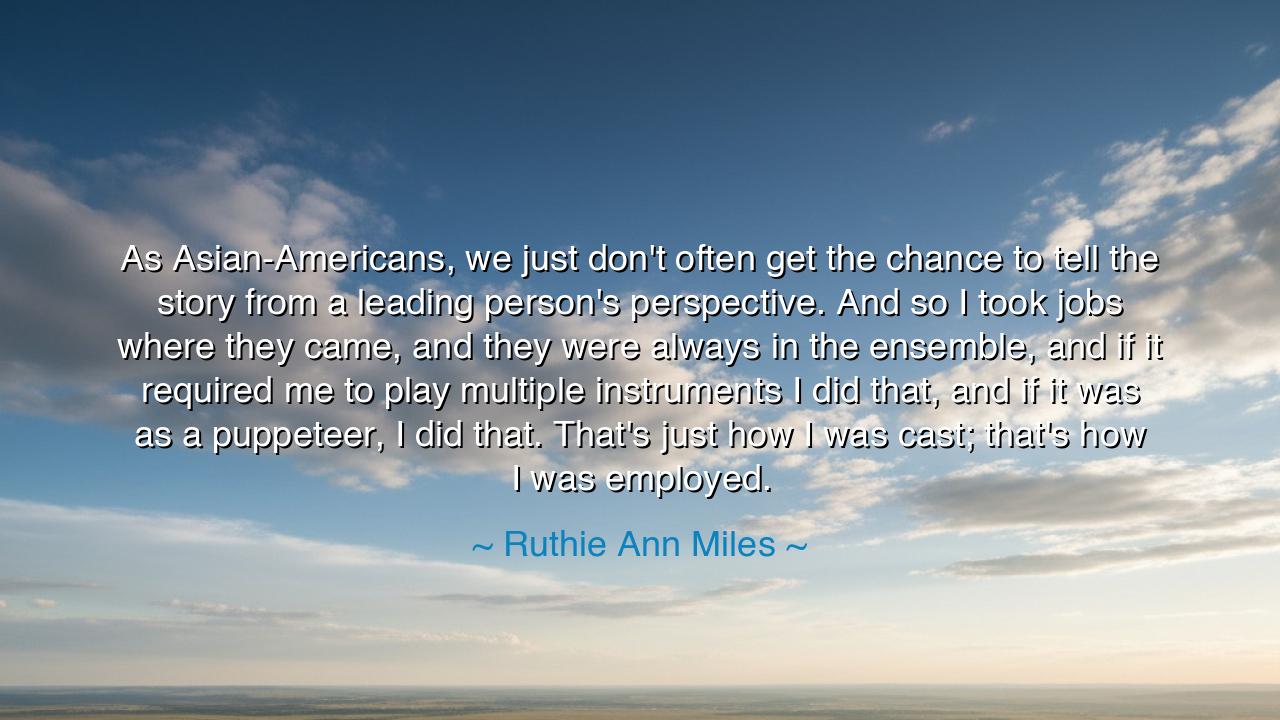
As Asian-Americans, we just don't often get the chance to tell
As Asian-Americans, we just don't often get the chance to tell the story from a leading person's perspective. And so I took jobs where they came, and they were always in the ensemble, and if it required me to play multiple instruments I did that, and if it was as a puppeteer, I did that. That's just how I was cast; that's how I was employed.






"As Asian-Americans, we just don't often get the chance to tell the story from a leading person's perspective. And so I took jobs where they came, and they were always in the ensemble, and if it required me to play multiple instruments I did that, and if it was as a puppeteer, I did that. That's just how I was cast; that's how I was employed." These words, spoken by Ruthie Ann Miles, echo the struggles and resilience of those who, despite their talent and potential, find themselves cast in roles far removed from the center of the story. In an era where many voices still fight to be heard, Miles shares the bitter truth that for Asian-Americans, the journey to the leading role is often long and fraught with compromise. She speaks not of defeat but of the quiet courage of navigating a world that underestimates and marginalizes their narratives.
The ensemble is not a place of weakness, as some might see it, but one of strength and versatility. In these words, we hear a call for survival, a testament to the adaptability that often becomes the armor of those excluded from the limelight. Just as an ensemble depends on its individual parts to create harmony, so too does the experience of those cast in supporting roles reveal a deeper form of strength. Miles’ willingness to play multiple instruments, both literally and metaphorically, is not mere submission but a deliberate act of showing that true artistry transcends the boundaries set by others. Versatility, in her eyes, is both a means of survival and a bold assertion of one’s worth.
This struggle for recognition is not new. History is filled with tales of those who were relegated to the shadows, their potential unacknowledged, their stories untold. Take, for instance, the story of Sojourner Truth, the African-American abolitionist and women’s rights activist, who, despite being born into slavery, rose to become a powerful voice for the oppressed. She too, like Ruthie Ann Miles, fought against the system that sought to silence her, yet found strength in her struggles. She was not just a voice in the ensemble but a leader whose words resonated across generations. Like Truth, Miles’ path to prominence is built not on a singular moment of arrival, but on the strength she demonstrates every time she steps into the ensemble, regardless of the role she is given.
Miles speaks to a broader experience—the experience of marginalized voices who often find themselves in positions where their contributions are diluted or overlooked. Yet, in this very position, there is power. For the ensemble is a microcosm of life itself. Often, it is in those moments where one is not the leading person that one can hone the qualities that make them an irreplaceable force in any setting. This is a lesson that echoes through the lives of those who were not born into power. Think of the humble beginnings of Nelson Mandela, who spent decades imprisoned in relative obscurity, yet emerged as a monumental figure in the fight against apartheid. His time as part of the ensemble—the collective struggle of his people—shaped him into a leader whose voice would one day echo in the halls of the powerful.
The lesson here, then, is one of resilience and perseverance. In the words of Miles, we are reminded that the absence of leading roles does not equate to a lack of purpose. Every ensemble is essential to the larger performance of life. It is the ensemble that holds the world together. Supporting roles—whether they are played in the theater or in life—are not less significant; they are the silent architects of society’s grandest endeavors. Miles, with her quiet courage, reveals that in any ensemble, it is not the position one holds but the heart with which one plays that matters most.
Thus, the lesson for us all is this: never underestimate the power of the ensemble. The support, the versatility, the willingness to play multiple instruments—these are the qualities that make one indispensable. In our own lives, we may not always be cast in leading roles, but like Ruthie Ann Miles, we must find pride in playing the roles we are given. Whether in our families, workplaces, or communities, it is the strength of the collective that makes the whole greater than the sum of its parts. In the end, it is the courage to keep stepping forward, no matter the role, that leads us to greatness.
So, to the marginalized, to those who find themselves in the ensemble: continue to play your part with conviction, knowing that your story—though not always told from the center stage—is shaping the world in ways seen and unseen. And when the moment arrives for the spotlight to shift, you will be ready. For you have always been the story.






AAdministratorAdministrator
Welcome, honored guests. Please leave a comment, we will respond soon